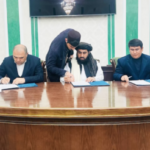Today, Iran’s Foreign Minister Abbas Araghchi arrives in Kabul for an official visit, presenting a critical opportunity to enhance relations between the two neighboring countries. The Afghan caretaker government must seize this moment to engage in frank and transparent discussions with Araghchi and focus on addressing issues that directly affect the people of both nations.
Unfortunately, Afghan refugees in Iran have faced severe hardships and challenges over the years. The Iranian government and relevant authorities have imposed harsh restrictions and inhumane treatment, making life increasingly difficult for these refugees. In recent months, the forced deportation of Afghan refugees and their mistreatment during the harsh winter have been blatant violations of international humanitarian principles. The Afghan government must make it clear to Araghchi that the mistreatment of Afghan refugees must cease immediately, and Iran must uphold the principles of good neighborly relations.
The plight of Afghan refugees is not just a national concern for Afghanistan but a significant humanitarian and political issue for the entire region. It is imperative for the Afghan government to seek support from international organizations and engage in clear and effective dialogue with Iranian officials to address this pressing matter. Araghchi must be reminded that Afghan refugees are not merely residents of a war-torn region but individuals with inherent human dignity who deserve suitable living and working conditions.
On the other hand, the Afghan caretaker government should also emphasize the importance of fostering bilateral economic and political ties during this visit. Afghanistan and Iran have immense potential to collaborate in trade, transportation, and energy sectors, which could pave the way for a prosperous future for their citizens. However, such progress is contingent upon Iran refraining from interfering in Afghanistan’s internal affairs and building relationships based on mutual interests.
Afghanistan and Iran share long-standing historical, cultural, and economic ties. However, meaningful progress in improving these relations will only be possible if a foundation of trust is established between the two nations. Araghchi must be explicitly informed that for peace and stability in the region, Iran needs to revise its policies regarding Afghan refugees and halt the oppressive measures imposed on them.
Moreover, the Afghan government should use this opportunity to address other critical issues, such as water resource management, trade barriers, and border security. Both countries stand to gain significantly from cooperation in these areas, and with proper management, long-term economic benefits can be realized. It is crucial to convey to Araghchi that achieving mutual benefits requires creating an environment of trust and collaboration.
In conclusion, the Afghan caretaker government must develop a clear and robust strategy for such diplomatic engagements to resolve the people’s pressing issues effectively. These meetings should not merely serve as platforms for discussions but should lead to practical steps that bring positive changes to the lives of the Afghan people. Improving the lives of Afghan refugees is not only a humanitarian responsibility but also a fundamental requirement for strengthening the bilateral relations between the two countries.













